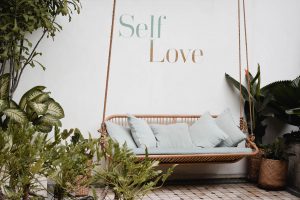We hear it all the time: “Love yourself!” We hear how loving ourselves is the most important, most beneficial thing we can do. But what we sometimes don’t hear, or fail to understand, is how. What is self-love? What does it mean to practice it? How do we begin to do so?

Self-love is having a relationship with yourself that has compassion, kindness, patience, tolerance, and curiosity. It does not mean that you are so nice to yourself that you never take accountability or responsibility for mistakes you made – “Oh, well, I really love myself and think I’m great, so that couldn’t possibly be my fault!” Self-love is about giving yourself grace and forgiveness when you inevitably make mistakes. It doesn’t mean that you are arrogant, or even worse – a narcissist; “I am better than everyone else, and everyone should work to satisfy my needs.” It is about believing in yourself and trusting yourself and your intentions.
Because the relationship you have with yourself is the only truly life-long relationship, self-love is the most important love of your life.
Why is it important?
Because you can’t share healthy love with others until you love yourself. You may feel love for others, but you may not be able to express it without fear. You may love others and want to relate to them but struggle to receive healthy love if you don’t love yourself first. The exchange of love in a healthy relationship requires concrete self-love.
Because you can’t pour from an empty cup. Think of the effort it takes to give love and affection, be emotionally available, or be thoughtful. If you don’t have reserves of self-love inside, your ability to give love will be diminished.
Because self-love heals past trauma and wounds. Many of us have been through trials in our lives that impacted our mental health, our sense of self, our outlook, and our world view. Often, traumas leave us feeling as though we are worth less than we were before the incident. Cultivating our sense of self-love to come from internal and not external sources allows us to move beyond negative past experiences.
Because once you have self-love, you can set better, healthier, more authentic goals for yourself. How many times have you set a goal for yourself that was rooted in negativity: hating the way your body looked, or feeling powerless at work, or feeling like a “failure” in a hobby or passion? When we love ourselves, we no longer seek to “fix” ourselves with unreasonable standards but instead seek to nourish ourselves. We have more accurate knowledge of our worth and our skills and can adjudicate what would be most beneficial to strive toward.
Most importantly, because you are deserving of the love you give so freely to others. This statement needs no explanation. You are worthy, just as you are, of love.

Self-love involves having the respect and consideration for yourself that you have for (and expect to receive from) others. It should be simple and straightforward, the idea that we treat ourselves at least as well as we treat the people in our lives, but sometimes, it is not. Occasionally, we get hung up or stuck on the idea of how self-love should look or our sense of worth. We want to self-love, but we struggle to do so.
There are three widespread barriers to self-love.
What gets in the way of self-love?
1) When the inner critic disapproves of your every move:

Your inner critic is the voice in your head that judges, criticizes, and mocks your every move. When the inner critic is loud and powerful, you are your own worst enemy. It hits you where it hurts: the mistake you made when parenting, or when you were leading the meeting at work, and it won’t let it go. It can be challenging to put the inner critic away, as it tends to feed itself: you make a mistake, the inner critic talks to you about it, you’re flustered and unable to let it go, your outlook changes, your mood drops, you say something unkind or thoughtless because you’re in a bad mood, the inner critic gets louder, you’re stressed out, the inner critic gets even louder… It has a snowball effect.
When you are unable to silence your inner critic, you carry your inner critic with you from place to place, event to event.
2) When you have high expectations of yourself:
There is a difference between having standards and having expectations that are too high. Standards can be a tool of self-love; “I will not tolerate being spoken to disrespectfully,” or “I expect the people in my life to respect my boundaries.” Putting pressure on yourself to meet impossible standards is the opposite.

When you have unrealistic expectations, you ultimately can not attain them or sustain them. You then feel like a failure or inadequate. When our expectations are too high, we set ourselves up to “fail” and begin to punish ourselves for not measuring up. It is hard to feel grace towards ourselves when we feel like we are just not enough. It is hard to be patient with ourselves when we feel like we should have already achieved a goal. It is hard to allow ourselves rest and relaxation when we don’t think we have excelled at a task or project. When we de-value ourselves over our perceived shortcomings, we then struggle to show ourselves kindness and care.
3) When it was not modeled for you:
As with everything in life, self-love is a skill you can learn. Our early life experiences have a great impact on the way we experience and practice self-love. I once read a great quote online that said, “Be careful with the way you speak to your child; it becomes their inner voice.”

If you were spoken with love and compassion as a child, you have a much easier time internalizing love and self-love. If you did not grow up in an environment with kind voices or a self-destructive parent raised you, it can be difficult to navigate loving yourself as an adult, but it is not impossible! The beauty of self-love is that you already have tons of kindness inside you because you give it to the people around you. There is nothing wrong with you if you are struggling with self-love. As adults, for us to have self-love and compassion, we need to be taught. From there, as with all skills, we need to practice.
The great thing about putting self-love into practice is that understanding why we may struggle with self-love and where those struggles may have originated is already an act of self-love. By reflecting on our experiences and habits, we are doing the kind of work that allows us to have compassion for ourselves, and compassion is an essential ingredient for honest love.
Once we are aware that we need more love for ourselves, we can begin to overcome the obstacles that stand in our way with tools that can be used at any time, in any place. When we put these tools to use, we not only treat ourselves with love and care on the inside but begin to express that self-love to the world. Our thoughts become our actions, which become our behavior. Our behavior dictates our standards, and we (and others) are compelled to meet them.
How do you engage in self-love? 3 Tools to practice and strengthen your self-love!
1) Talk to yourself the way you talk to someone you love:
Think of the things you say to yourself when you are frustrated, upset, or embarrassed. Now imagine saying those things to a loved one like a friend, partner, or family member. Would you? Now imagine that friend, partner, or family member is sitting opposite you, saying those negative things about him/her/themself. How would you respond?
Dr. David Burns has a tool called “the double standard” in his book “The Feeling Good Handbook.” He suggests that you can pretend someone you love is having the same negative self-talk you are having right now. Pretend they were saying those thoughts to you and write down how you would respond to them.
This is a great tool because it works on more than one level: the first thing it does is stop the thoughts in their tracks when you imagine these angry or unfair words about a loved one. Would I speak to a friend this way? No. Would I be comfortable hearing a friend talk about him/her/themself this way? No. As we discussed above, negative self-talk can begin to spiral and become unmanageable. Nipping it in the bud can help to rein it in a little. Whether or not you have a lot of time to address the talk and analyze what you might say to a friend in a similar situation, you have successfully paused the narrative. This is when the next level of this tool sets in unpacking what was said and responding with kindness. Even if you don’t have the time to debrief the incident right at that moment fully, you can return to it later when you are in a safe space to do so.
2) Self-care:
You might think that you will be unable to provide yourself with self-care until you are a professional at self-live, but this is not the case. Acts of self-care inform your mindset, the way actions that lead to behaviors always do.
You may think that self-care is “a spa day” or involves being selfish, but that is not true. Self-care is simply any action that is taken with the intent of meeting your needs, whether they’re physical or emotional. It is not selfish to practice self-care because it brings the best version of you to the world. You cannot pour from an empty cup. You need to learn to fill up your cup; if you are not well, nothing and no one around you will be well.
While it is true that, for some, a trip to the spa is their ultimate act of self-care, there are many more acts of self-care that can be taken. You can phone a friend or loved one to chat or do a quick meditation. You can go for a walk or watch a YouTube video about unlikely animal friendships. You can set a sleep schedule for yourself. You can learn to cook your favorite dish. You can write a list of self-care acts that you would enjoy and work on checking off every item on your list! Watch a movie. Drink more water. Make a list of the things in your life that you are grateful for. Pour yourself a bubble bath, light a bunch of candles, and put on your favorite podcast. The possibilities are endless, and they’re all correct, as long as they work for you.
3) Boundaries:
One of the best ways to grow our self-love is to be able to self-advocate. In standing firm in and expressing our needs, we provide ourselves with care and respect. Setting boundaries with ourselves and others is a great way to communicate and strive for our needs.
Boundaries start with identifying what they are and then asserting them. The process of identification affirms our worth of having them in the first place; it is through knowledge of our worth that we nurture the support and compassion we deserve to give to ourselves. Taking the time and making an effort to stick to our boundaries is ongoing self-care. When we set boundaries, we define our values and clarify our goals; we know what is important, and we know ourselves well enough to be realistic about our purpose.
When our boundaries are expressed to others, the end result is that we find ourselves surrounded by people who respect us, fostering an environment of respect that we have the emotional support to uphold. A boundary is a protection of sorts; when we establish and enforce a boundary, we protect ourselves. Think of the people in your life about whom you feel protective. You know that part of the reason you work to protect them is that you love them. Protecting ourselves in healthy ways, through selected boundaries, is showing ourselves, love.

When we are working at utilizing our self-love engagement tools, it is important to keep in mind that sometimes it might be harder to express our self-love than others. When this happens, we can remind ourselves that “love” and “like” are two separate things: you probably always love your best friend, even if sometimes you don’t like their behavior, or you feel frustrated that they’re not making as much time for you right now. Self-love is the same: expressing and practicing it might sometimes feel like more of a challenge or more of a struggle to find the love at all. But as is the case with your friendship, you know that there is always love there. Remind yourself of the same thing: even at times when you struggle to utilize the tools at hand, or you feel like it’s dwindled, that love does live inside of you. Be kind to and patient with yourself; nurture your self-love gently.
A year ago, we might not have been able to foresee spending so much time with ourselves. Whether you have been alone in lockdown or sharing space with only one other person or working within a much smaller bubble, the fact is that we have been less “busy” socially. As a result of this, we have had far fewer emotional distractions; external validation and stimulation have dropped significantly for most of us. This time has probably brought to light some introspection and self-analysis.
Self-love doesn’t mean that you are perfectly content to be alone; self-love allows your inner peace with your thoughts. If the past twelve months have taught us anything, it is that the only guaranteed company we keep throughout our lives is ourselves. Our thoughts and feelings about ourselves won’t always be glowing and joyful, but the work we do to have kindness and compassion for ourselves is immeasurably beneficial.
Embracing You Therapy Group Practice
Here at Embracing You Therapy, we invite you to explore with us how life would be different if you had more control over your thoughts and emotions, and we invite you to consider that it is possible to accept things just as they are, embracing imperfections to create a gentler place for calm in your life.
Let’s learn what drives your unique perspective on anxiety and stress. Then, let’s find the tools-your unique tools-that help you respond to life in a healthy, calm way. Contact us today for your complimentary 15-minute phone consultation with one of our Client Care Coordinators.





